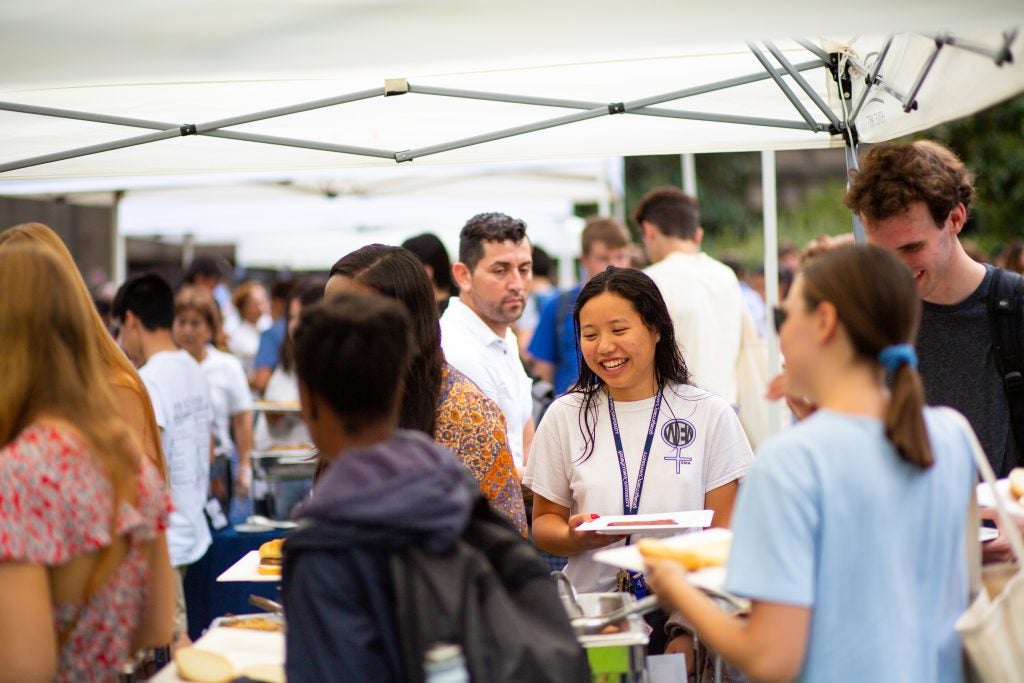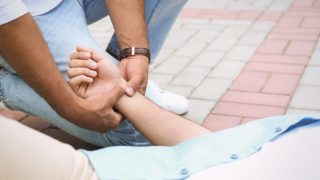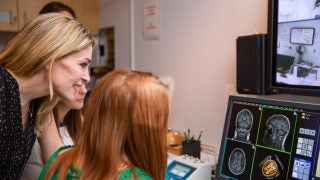This story is a part of our Ask a Professor series, in which Georgetown faculty use their research to inform trending conversations, from the latest pop culture hits to research breakthroughs and critical global events shaping our world.
The key to happiness is simpler than we think.
Helping others — even tiny acts of kindness — makes us happier, says Abigail Marsh, a professor in the Department of Psychology and the Interdisciplinary Program in Neuroscience who studies altruism.
“It drives me bananas when I see advice lists about how to be happier that center on self-focused, often solitary activities like listening to music, taking a bath or buying yourself something,” she said. “They might give you a momentary burst of pleasure but not enduring happiness.”
According to Marsh’s research, donating money, petting a stranger’s dog or volunteering boosts your mood and motivation to do good. Over time, that warm, fuzzy feeling we get from helping others can have long-term benefits.
“We experience vicarious pleasure from helping — literally a little echo, or simulation, of the happiness we see in others,” she said. “It gives us a sense of pride in having done something we know to be worthwhile. And most importantly, it strengthens our social relationships and sense of connectedness to other people, which is essential for real happiness.”
Marsh and fellow researcher Shawn Rhoads (G’22) reported that even observing others act altruistically has its own ripple effect: It can improve our mood, energy and desire to do good things for others, among other benefits.
So why does helping others make us feel good? And how can we make it a habit, especially when we feel down or unmotivated?
Marsh, who leads Georgetown’s Laboratory on Social & Affective Neuroscience, takes us inside the brain and uncovers why we feel good when we do good — and how we can make it a lasting habit.
Why does it make us feel good when we do good for others?
We are such fundamentally social creatures. Many scientists consider humans “self-domesticated apes.” This means we evolved to be unusually mutually interdependent compared to our primate cousins. Our interdependence required us to evolve a high capacity for trust and relatively friendly, non-aggressive temperaments. Being so mutually interdependent means we are naturally predisposed to find helping those around us rewarding. We are built that way. We perceive other people, especially people we like and trust, as extensions of ourselves who we naturally empathize with and whose welfare we want to promote just as automatically as we want to promote our own welfare.
What’s happening inside our brains when we perform altruistic acts?
The brain is of course complicated, as is altruism, so I will just highlight a few of the key processes! First of all, there are populations of cells in regions that include the amygdala and the rostral anterior cingulate cortex (which lies a few centimeters behind your forehead) that calculate the value of your choices for others. Coordinated activity between those regions may motivate us to help others.
Then, when you do things that help others, activity increases in brain regions involved in reward learning and reward anticipation. This may be related to what is called the “warm glow” of helping. These regions include the ventral striatum, where the neurotransmitter dopamine is released when we learn a behavior is rewarding. Increased activity in this region is associated with wanting to repeat rewarding activities.
What are some of the benefits we may experience from helping others?
There is now abundant evidence that helping others makes us happier, for multiple reasons. We experience vicarious pleasure from helping — literally a little echo, or simulation, of the happiness we see in others. It gives us a sense of pride in having done something we know to be worthwhile. And most importantly, it strengthens our social relationships and sense of connectedness to other people, which is essential for real happiness.
Helping others really does lead to enduring well-being, although the paradox is you have to be helping because you sincerely want to help. If you are only helping out of a sense of obligation or to reap selfish gain, it may not lead to similar benefits.
